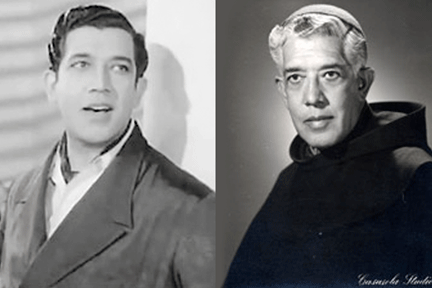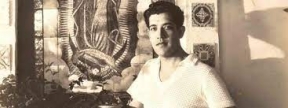José Mojica; The Franciscan Who Triumphed In Hollywood
News Category: News, Community News, and General Discussion
-
The tenor and actor José Mojica, originally from San Gabriel, Jalisco, participated in numerous films in Mexico and the United States and later joined the Order of Friars Minor.
At the beginning of the 13th century, the son of a rich merchant decided to renounce the world of luxury in which he had lived in order to devote himself to helping the poor and the sick. His name was Francis and he lived in Assisi, Italy.
If in his father’s castle he had enjoyed the songs that spoke of the exploits of chivalry, in his life of fasting and solitude he listened to the song of water and birds and composed his own songs to the God of Christians.
He founded a religious order, that of the Friars Minor, for those who wanted to be united with poverty. Seven centuries later, the Mexican tenor José Mojica, the Hollywood star who turned his voice into an instrument of peace, joined this Franciscan congregation.
José Mojica was born in San Gabriel, Jalisco, on September 14, 1896, and moved with his mother to Mexico City at a very young age. In the days when the Revolution was bleeding the country’s capital, Mojica discovered that his passion was in music.
At the same time, he went through a severe spiritual crisis, which led him to learn about different religious and esoteric expressions that confronted him with his mother’s Catholicism.
Skeptical at last of metaphysical experiences, he decided to make singing his only practice of worship and began to educate his voice at the National Conservatory of Music, with José Pierson, teacher of great interpreters such as Pedro Vargas and Jorge Negrete.
During that time -according to an interview that José Revueltas made to Mojica in 1943- he avidly read Friedrich Nietzsche, especially Ecce Homo. He was my idol,” said the singer.
In the last years of the armed period, Mojica achieved his first success in the Abreu and Ideal theaters. He traveled to the United States to look for luck and found it as a dishwasher in a New York hotel.
It was not long before he joined an opera company that allowed him to be heard by Enrico Caruso, the paradigmatic Italian tenor, who was sensitive to Mojica’s talent and recommended him to the Chicago Opera Company.
This forced him to perfect his command of English, French, and, of course, Italian. It did not take him long to appear at the Metropolitan Opera House in New York.
It was necessary to reproduce and preserve that marvelous voice, so José Mojica began recording records with the Edison House and this was his passage to the incipient world of Hollywood.
There is a saying that when God giveth, he lendeth. Mojica’s fame coincided with the beginning of sound films. Her good voice was added to an ideal physical presence for the screen and in 1928 she filmed her first movie, El precio de un beso (The Price of a Kiss).
During the following decade, he established himself as a movie star in films such as El Rey de Los Gitanos and Don Gil de Alcántara, all of them box-office hits in the United States and Latin America. Mojica was part of the group of Mexicans formed by Dolores del Río, Lupe Vélez and Ramón Novarro, who were then the fascination of the screen.
In the late 1930s, he returned to Mexico and bought a house in San Miguel de Allende, Guanajuato. Those were the days when other admirable tenors such as Juan Arvizu, Alfonso Ortiz Tirado, and Genaro Salinas sang for the microphones of XEW and XEB.
María Grever, for her part, was beginning to be considered the star composer of the Spanish-speaking world with songs like Júrame, which, of course, Mojica interpreted.
A Franciscan friar character awakened her religious vocation.
In 1937 she began filming La Cruz y la Espada. To perfect his character of a Franciscan friar, he spent a few days in a Franciscan convent.
Something moved him in that stay to the point that he decided to take the vows of poverty, obedience, and chastity. He wanted to renounce, as the holy founder did, the superficiality of the world and to consecrate his days to charity.
If Francis of Assisi had sung to Brother Sun, he could make his voice the vehicle for his communication with God.
He reaffirmed his decision after the death of his mother in 1940. Before beginning the process to be ordained a priest, he entered as a member of the Third Order of St. Francis, destined for the laity.
He still managed to film El capitán aventurero, alongside Manolita Saval, and Melodías de América, his last film. It was during this filming that he communicated to Agustín Lara -who musicalized the movie- his intention of taking the Franciscan sackcloth. Impressed by the news, Lara composed for him Dime, whose verses became famous:
Dime si tus ojazos negros,
Que tanto yo he querido,
Lloran por mí.
Dime si tu boca bonita,
Que tanto yo he besado,
Suspira por mí.TRANSLATION
Tell me if your big black eyes,
That I have loved so much,
Cry for me.
Tell me if your pretty mouth
That I have kissed so much,
Sighs for me.In August 1941 A media luz was premiered starring the Argentine singer Hugo del Carril and Carmen Montejo.
On the poster of the show, there was another announcement: “See the ordination ceremony of José Mojica as a Franciscan priest in the cathedral of Lima, Peru”. From then on he was known as Friar José Francisco de Guadalupe.
The man from Jalisco decided that it would be in the Andean convent of Cuzco where he would prepare himself spiritually for his ordination. He remained there for the rest of his life.
In 1959 the movie Yo pecador, inspired by Mojica’s autobiography and made with his approval, was released in several movie theaters in Mexico City. It starred the top Mexican film stars: Sara García, Libertad Lamarque, Pedro Armendáriz, Andrés Soler, Enrique Rambal and Christiane Martell. The lead role was played by Brazilian actor Pedro Geraldo.
The film appeared at a historical moment when the special emphasis was given to “decency” and “good manners” promoted by the right-wing and the Catholic Church in opposition to the PRI State.
In the advertisements published by EL UNIVERSAL, the Mexican Legion of Decency cataloged it as “the film of the year”, while the Primate Archbishop of Mexico, Monsignor Dario Miranda, commented that Mojica’s story was “a providential design of God”.
However, Mojica did not follow a life of strict enclosure. Several times the order’s father provincial granted his permission for him to perform as a tenor or actor on stages in Latin America. In the 1960s, for example, he performed in Mexico alongside Andrea Palma in the play Lodo y Armiño.
But surely his best-remembered performance, already as a friar, was in Seguiré tus pasos, with the child actor Juliancito Bravo and Manuel López Ochoa, in 1968. The profits he earned were dedicated to charitable works promoted by the Franciscans.
-



Leave a Reply